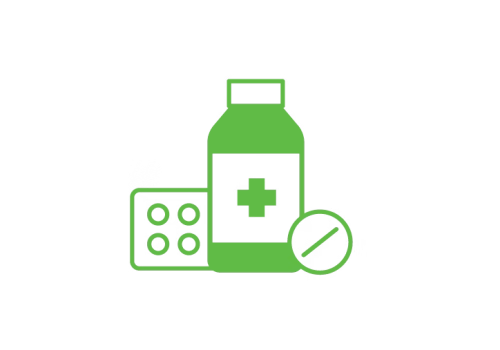Green Plan
Climate change poses a major threat to our health as well as our planet.
Our aim is to improve people’s health, yet carbon emissions and pollution generated by healthcare has the opposite effect.
Nationally, the NHS is responsible for 4 per cent of national carbon emissions and 40 per cent of emissions from the public sector.
The UK has committed to reaching net zero carbon by 2050, and the NHS has a legal duty to act on the emissions from its activities and an opportunity to go beyond the national ambition as defined in the Delivering a Net Zero NHS report.
To do this, the NHS in Greater Manchester has set three goals to reduce our environmental impact and reach net zero carbon emissions. Net zero is when the amount of greenhouse gases (like carbon dioxide) produced by human activity in the NHS is completely negated through a combination of reducing emissions in the first place and, to a lesser extent, removing emissions from the environment.
The NHS Greater Manchester Green Plan goals are:
- Reduce the emissions we control directly (the NHS Carbon Footprint) to net zero by 2038
- Reduce the emissions we can influence (our NHS Carbon Footprint Plus) to net zero by 2045
- An NHS that is climate-adapted, actively supports nature and health related activities, and promotes interventions that reduces air pollution.
All health and care services in Greater Manchester have an important part to play to achieve these targets.
Climate emergency
Greater Manchester was the first integrated care system to declare a “climate emergency”. We published our first Green Plan in 2022 and in July 2025 we published our second Green Plan with an updated set of priorities over 2025 to 2028.
The Green Plan sets out our vision of a healthcare system that is environmentally, socially and financially sustainable, adapted to deal with the impacts of climate change, and deeply rooted in the principles of climate justice.
Nature emergency
Closely linked with the climate emergency is a global nature (biodiversity) emergency, which is also driven by human activity through habitat loss from farming and industry, pollution, overexploitation (hunting, fishing and logging) and climate change. This reduction in nature reduces our resilience to climate-driven extreme weather events and limits the benefits of green spaces for health.
Greater Manchester Combined Authority has developed their Local Nature Recovery Strategy ‘Nature for All’, which NHS GM supports. We collaborated with Sow the City to develop a toolkit, helping staff enhance green spaces and nature across the NHS estate of all sizes. It includes solutions from bird boxes to woodland areas, giving costs and possible funding sources.
Focus areas
Our green plan has 10 areas that we are focusing on. Find out more about them below.
 Why this matters
Why this matters
Over 250,000 people work in health and social care in Greater Manchester.
National research shows that 87 per cent of NHS staff support the work to achieve net zero carbon emissions.
Training and development related to climate change can help staff play their part and come up with innovative ideas.
What are we doing?
- Adding environmental sustainability considerations for new projects.
- Sharing training with GPs and hospitals.
- Supporting hospitals to deliver their Green Plans.
 Why this matters
Why this matters
Each health treatment or condition requires the involvement of specific staff or procedures.
Providing care closer to home – in primary care (GP, opticians, pharmacy and dentists) or in the community – reduces journeys and readmissions to hospitals. So does better home and social care, and social prescribing
As well as providing better care for people, this will help to reduce carbon emissions.
What are we doing?
- Improving people’s physical and mental health to reduce the need for healthcare.
- Helping people access healthier, warmer housing.
- Designing care that is better for people and the environment.
 Why this matters
Why this matters
We are already experiencing the effects of climate change, including more extreme weather, heatwaves and flooding. These are a threat to people’s health, healthcare buildings and critical infrastructure.
Climate change adaptation is how we adapt and prepare for these risks.
What are we doing?
- Raising awareness of climate change impacts and steps healthcare sites can take to prepare.
- Supporting hospitals and other healthcare sites to have climate change adaptation plans.
- Working with councils to understand and prepare for climate change impacts such as flooding and heatwaves.
 Why this matters
Why this matters
Using digital technology can reduce the amount of travel to healthcare appointments.
For example, virtual appointments can reduce carbon emissions while still providing good patient care.
New innovative products and research can help healthcare services run more efficiently with a reduced carbon footprint.
What are we doing?
- Adding sustainability considerations for new digital projects.
- Supporting and promoting innovative opportunities to improve care.
 Why this matters
Why this matters
Every year, poor air quality contributes to 1,200 deaths in Greater Manchester
In towns and cities, road vehicles are the main source of air pollution. Healthcare travel contributes to this, but people can also be affected by poor indoor air quality.
The most vulnerable people – children, older people and those with health conditions – are hit hardest by air pollution.
What are we doing?
- Working with Transport for Greater Manchester, the organisation which is responsible for transport policies in the region.
- Supporting hospitals and other healthcare sites to have sustainable travel plans.
- Using low and ultra low emission vehicles.
- Improving access to healthcare sites by public transport (like buses or the Metrolink).
- Improving access to healthcare sites by walking, wheeling and cycling.
 Why this matters
Why this matters
In Greater Manchester, NHS estates (our buildings and their grounds) contribute a large part of our carbon emissions.
However, we can reduce the amount of energy and water we use, and send less waste to landfill.
What are we doing?
- Working with Greater Manchester Combined Authority, the combined authority which brings together all 10 borough Councils and the Mayor’s office.
- Introducing energy saving measures such as LED lighting and insulation.
- Using renewable energy – like air and ground source heat pumps and solar panels – to heat buildings rather than fossil fuels.
 Why this matters
Why this matters
Some medicines contribute to global warming, for example anaesthetic gases or some asthma/COPD inhalers which contain powerful greenhouse gases.
We can reduce this by using ‘greener’ alternatives where appropriate or improving people’s health so they don’t need them!
What are we doing?
- Improving the treatment and care for people with respiratory conditions (like asthma or COPD) including the use of green inhalers
- Changing the types of gases used in operating theatres.
- Reducing medicine waste.
- Supporting pharmacies to reduce their carbon footprint.
 Why this matters
Why this matters
A large part of the NHS’s carbon footprint (the total amount of greenhouses gases generated by our activities) comes from the goods and services we buy from our partners and suppliers.
We can influence this. That’s why the NHS has published the Net Zero Supplier Roadmap to help suppliers understand how they can help the NHS meet its net zero targets.
What are we doing?
- Taking net zero and social value into account (weighting) when awarding contracts.
- Piloting reusable or remanufactured products as alternatives to single-use items.
- Supporting our suppliers to assess and reduce their carbon footprints.
 Why this matters
Why this matters
What we eat has a big impact on our health and wellbeing, and healthier foods mainly have lower carbon emissions.
Many people are not able to access affordable fresh fruits and vegetables, but activities like community food gardens and cooking classes can help.
By serving tasty, seasonal, and healthier food in hospitals this can help to reduce food waste and carbon emissions.
What are we doing?
- Working with Greater Manchester Combined Authority to include healthy and sustainable food in local policies.
- Increasing the seasonal and plant-based menu options in hospitals.
- Reducing food waste
 Why this matters
Why this matters
Spending time in green places like parks, gardens, woodlands, canals and rivers can help to improve our health and wellbeing.
They are also good for the environment as they improve air quality, reduce noise, provide shade, reduce temperatures and help to prevent flooding.
Over a quarter of Greater Manchester is made up of urban green spaces, but some places have more than others. More also needs to be done to improve biodiversity: the variety of animals, plants and fungi in these places.
What are we doing?
- Encouraging healthcare providers like GPs and hospitals to develop and enhance their local green spaces.
- Using green spaces at healthcare sites to support ‘green’ social prescribing.
Hospitals
In addition to the NHS GM Green Plan, each of the nine hospital trusts in Greater Manchester also has its own green plan.
This enables us all to work together to reach net zero. Find out more on the following links (we can’t guarantee the accessibility of content on other sites).
- Bolton NHS Foundation Trust (PDF)
- The Christie NHS Foundation Trust (PDF)
- Greater Manchester Mental Health NHS Foundation Trust (PDF)
- Manchester University NHS Foundation Trust (PDF)
- Northern Care Alliance NHS Foundation Trust (PDF)
- Pennine Care NHS Foundation Trust (PDF)
- Stockport NHS Foundation Trust (PDF)
- Tameside and Glossop NHS Foundation Trust
- Wrightington, Wigan and Leigh NHS Foundation Trust (PDF)
Want to find out more?
Transport services in Greater Manchester
Services to help you get to and from your health appointments, including help with costs.
More information More informationGreater Manchester Green City
Greater Manchester’s ambitious approach to climate action.
Read more Read more about Greater Manchester Green CityWorld Health Organisation
Information about climate change and health.
Visit the website Visit the World Health Organization website
